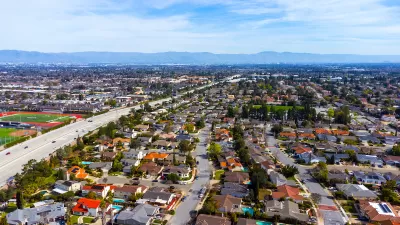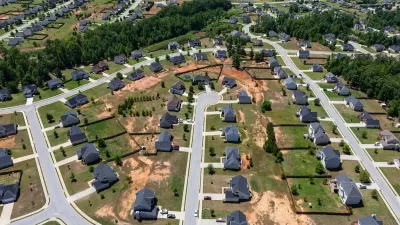Experts argue that zoning, housing, and transportation policy are intimately linked.

In an article for the Federation of American Scientists, Sam Maloney and Rohit Swain propose a new mechanism for forcing states to adopt zoning reform: highway funding.
According to the article, “The mandated underbuilding of US housing in rich coastal cities led to an estimated 36% loss in growth from 1964 to 2009 (newer estimates are smaller but still are significant amounts of lost value).” Thus, federal action is needed to boost housing production.
As a legal precedent, they point to “23 U.S.C. §158, which imposed a national minimum drinking age by taking away recalcitrant states’ highway funding,” as well as state laws in California and Montana that limit the ability of local jurisdictions to impede housing construction.
“Congress should pass legislation following 23 U.S.C. §158 requiring each state with a Metropolitan Statistical Area where the median renter is rent-burdened (i.e., median rent is at least 30% of area median income) and where area median income exceeds the US median income to submit a plan to HUD detailing how they will address the rent crisis in their state.” States that don’t comply could then lose Highway Trust Fund appropriations. The authors also recommend that federal agencies include density and housing criteria when awarding transit grants.
For the authors, the link between transportation and housing is clear: “[T]he federal government has an interest in ensuring its transportation is an efficient use of taxpayer money, and under exclusionary zoning, development is encouraged to unnecessarily sprawl overloading interstate highways, thus forcing expensive highway widenings.”
FULL STORY: Exclusionary Zoning or Highway Funds, Your Pick: A Viable Mechanism for Federal Action on Zoning

Planetizen Federal Action Tracker
A weekly monitor of how Trump’s orders and actions are impacting planners and planning in America.

Maui's Vacation Rental Debate Turns Ugly
Verbal attacks, misinformation campaigns and fistfights plague a high-stakes debate to convert thousands of vacation rentals into long-term housing.

Restaurant Patios Were a Pandemic Win — Why Were They so Hard to Keep?
Social distancing requirements and changes in travel patterns prompted cities to pilot new uses for street and sidewalk space. Then it got complicated.

In California Battle of Housing vs. Environment, Housing Just Won
A new state law significantly limits the power of CEQA, an environmental review law that served as a powerful tool for blocking new development.

Boulder Eliminates Parking Minimums Citywide
Officials estimate the cost of building a single underground parking space at up to $100,000.

Orange County, Florida Adopts Largest US “Sprawl Repair” Code
The ‘Orange Code’ seeks to rectify decades of sprawl-inducing, car-oriented development.
Urban Design for Planners 1: Software Tools
This six-course series explores essential urban design concepts using open source software and equips planners with the tools they need to participate fully in the urban design process.
Planning for Universal Design
Learn the tools for implementing Universal Design in planning regulations.
Heyer Gruel & Associates PA
JM Goldson LLC
Custer County Colorado
City of Camden Redevelopment Agency
City of Astoria
Transportation Research & Education Center (TREC) at Portland State University
Jefferson Parish Government
Camden Redevelopment Agency
City of Claremont





























